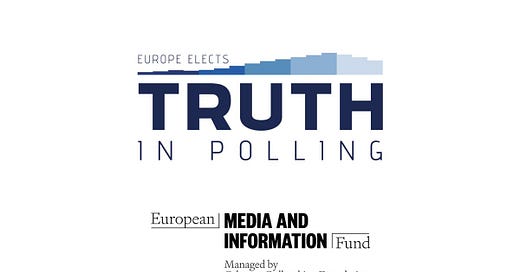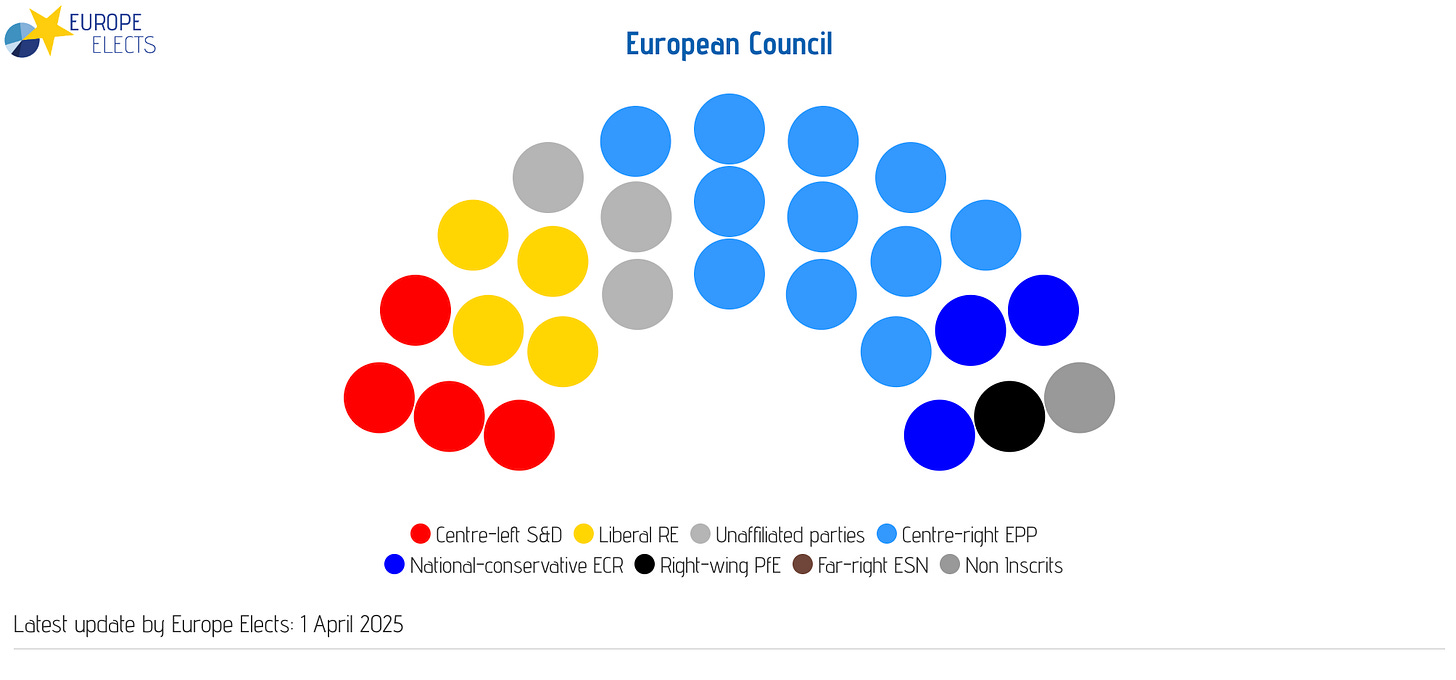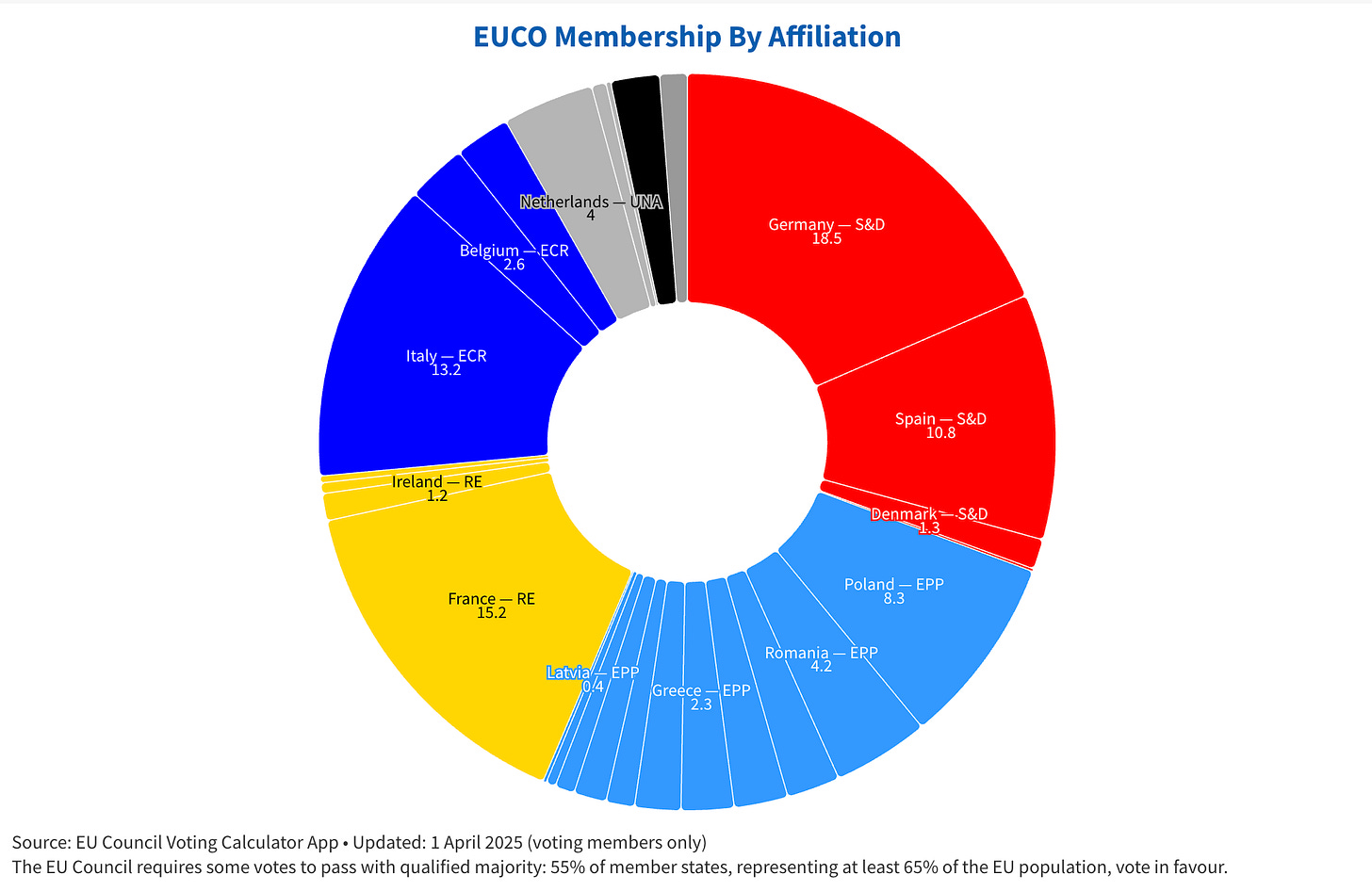For the first time in a while, it’s been a pretty relaxing month, as far as European elections go. That won’t be true for long , though, especially as we head into two contested presidential elections (Poland and Romania), a snap election (Portugal), and stalled government negotiations (Kosovo). Additionally, Germany appears to be just days away from investing a new Chancellor. But first, if you’d like to encourage others to subscribe, please use this link:
Truth in Polling Project
Europe Elects: Truth in Polling (EETIP) is a publicly available database of pollsters in each European country, assessing essential information related to their activities. With this project, we aim to promote transparency in the polling industry, as well as deepen dialogue with political pollsters in countries of the European Political Community with the goal of reviewing their work collaboratively with them.
This project is supported by the European Media and Information Fund
Learn more here.
All-Elects Fundraiser (2024-2025)
Last year, we at Europe Elects launched a fundraiser to ensure the continuation of our mission: providing accurate and accessible polling data to empower European citizens and support democracy. This year, the stakes are even higher, as we are asking for your support in maintaining not only Europe Elects, but all of our other branches: Africa Elects, America Elects, Asia Elects, and Oceania Elects.
Every donation, no matter the size, is an investment in democracy and the future of free, accessible information.
Finnish Election Aftermath
This month’s county and municipal level elections saw significant gains for the centre-left Social Democratic Party of Finland (SDP-S&D). The SDP is now the largest party in nine of Finland’s 21 wellbeing services counties, a political division equivalent to Finland’s regions minus the Åland Islands and the capital, Helsinki. This result is more than double the number of counties in which the SPD represented a plurality after the 2022 county election. The centrist and agrarian Centre Party of Finland (Kesk.-RE) is the largest in eight counties, and the ruling centre-right National Coalition Party (Kok.-EPP) is the largest in just two. The remaining two pluralities are held by the liberal and Swedish minority interest Swedish People’s Party of Finland (SFP-RE).
The overlap between Finland’s wellbeing services counties and its regional divisions does mean that these elections could be a bad indicator for KOK’s reelection prospects at the 2027 parliamentary elections.
However, the most noteworthy thing to come out of this month’s elections was the drop in support for the national-conservative Finns Party (PS-ECR). The party lost more than half of its municipal seats and saw its county election vote share drop by 3.3 percentage points.
Vienna Election Aftermath
The ruling coalition of the centre-left Social Democratic Party of Austria (SPÖ-S&D) and liberal NEOS – The New Austria (NEOS-RE) won another 5-year term governing Austria’s capital. The SPÖ-NEOS coalition will be one seat smaller than before the election, due to the SPÖ losing three seats. The big news, though, was the right-wing Freedom Party of Austria (FPÖ-PfE) leapfrogging into second place. The party now holds 22 seats, more than double the number it won in 2020. This surge mirrors the growth the FPÖ has seen nationally. In 2024, it became the largest single party in the Austrian parliament and, for a moment, seemed poised to head a government.
European Parliament (EP) seats projection
The next European Parliamentary election is still four years away, but in the meantime, we’ll keep updating our predictions. The latest projection can be found here.
EPP: 176 (-12)
S&D: 130 (-6)
PfE: 102 (+18)
ECR: 79 (+1)
RE: 79 (+2)
G/EFA: 33 (-20)
LEFT: 58 (+14)
NI: 24 (-9)
ESN: 37 (+12)
Unaffiliated: 2 (+2)
+/- vs. 2024 EU Parliamentary Elections
European Council (EUCO) tracking + Other European Heads of State
Europe Elects does not limit its coverage of EU politics to the European Parliament. Being composed of 27 political leaders from the entire continent, the European Council is an entity shaping the political priorities of the Union.
The Council’s composition changes much more frequently than the Parliament’s—and thanks to our coverage, you can see the timeline of those dynamic shifts at any moment here.
Below, you can see the European Council's current composition, as well as its membership weighted by population.
Notable Updates
Germany: the new cabinet of Friedrich Merz (CDU/CSU-EPP) looks set to be inaugurated on 6 May. Merz’s centre-right Christian Democratic Union of Germany (CDU-EPP) will enter government at the head of a coalition with the outgoing ruling centre-left Social Democratic Party of Germany (SPD-S&D)
Kosovo: more than two months after parliamentary elections, Kosovo still hasn’t been able to elect a parliamentary speaker and, by extension, invested a new government. The electoral math has made it difficult for the centre-left SELF-DETERMINATION Movement! (LVV-S&D) to form a coalition despite emerging from February’s election as the largest party. Most major parties have ruled out cooperation with the LVV, leaving the party of Acting Prime Minister Albin Kurti (LVV-S&D) to try and cobble together a coalition from the various ethnic minority parties. As we mentioned in our previous issue, “even if LVV was able to bring on board every other single minority party, it would still be two seats short and would need support from the right-wing Serb List (LS~EPP) with whom (to put it nicely) it has a tense relationship.”
Serbia: Đuro Macut (*) was elected Serbia’s new prime minister this month in a 16 April vote. 153 lawmakers in the 250-seat parliament supported his investiture. These included members from the centre-right Serbian Progressive Party (SNS-EPP), centre-left Socialist Party of Serbia (SPS~S&D), centrist Party of United Pensioners, Farmers, and Proletarians of Serbia – Solidarity and Justice (PUPS-solidarity and justice~NI), right-wing United Serbia (JS-*), centre-left Social Democratic Party of Serbia (SDPS~S&D), and the right-wing Alliance of Vojvodina Hungarians (SVM-EPP). Macut’s appointment comes after Miloš Vučević (SNS-EPP) resigned as prime minister earlier this year, as a result of the sustained anti-corruption protests that have dominated Serbia for several months. It is unclear whether Macut’s premiership will succeed in addressing the protesters' demands and whether he will represent a genuine break with the increasingly anti-democratic rule of President Aleksandar Vučić (SNS-EPP).
Electoral Calendar 2025/2026
Do you want to be sure not to miss any major election coming up?
Europe Elects doesn’t want you to either! Check out our publicly available electoral calendar for the upcoming year.
Some Upcoming Elections
Romania (Presidential — First Round): 4 May
Vatican City (Papal Conclave): 7 May onwards
Albania (National Parliament): 11 May
Poland (Presidential — First Round): 18 May
Portugal (National Parliament): 18 May
Romania (Presidential — Potential Second Round): 18 May
Polling Highlights
Want to stay informed about any polls published across the continent? Check out Europe Elects' Polling average to keep up with all the latest polls.
Wider polls are hyperlinked below.
Germany: this month's Forsa poll shows the far-right Alternative for Germany (AfD-ENS) at 26%, a record high. The Forsa poll shows AfD ahead of all other parties as well as the centre-right CDU/CSU (EPP) alliance.
Greece: anti-establishment Course of Freedom (PE-NI) reaches an all-time record high with 17.8% in the latest MRB poll. If repeated in an election, it would be the party’s highest result since it was founded in 2016 by former parliament speaker Zoe Konstantopoulou. Meanwhile, the national-conservative Greek Solution (EL-ECR) has reached an all-time record high with 12.9% in the latest Prorata poll. If repeated in an election, it would be the right-wing party’s highest result since it was founded in 2016.
Netherlands: centre-right New Social Contract (NSC-EPP) of Pieter Omtzigt reaches a record low at 1% of the vote, in the latest Peil poll. NSC was founded in late August 2023 and was the country's largest party around 19% in Europe Elects' polling average as late as October 2023.
Romania: the centre-right Save Romania Union (USR-RE) national bureau has withdrawn its support for party president and presidential candidate Lasconi (USR–RE), backing instead Dan (*-RE) for the 2025 presidential election.
Lasconi (USR-RE) says she will continue her campaign without party backing.
In the EuropeElects presidential polling average, Lasconi (USR-RE) currently polls at 7%. Dan(*-RE) is currently polling at 21%, while Antonescu (PSD/PNL/UDMR–S&D/EPP) stands at 23%. The Mayor of Bucharest, Dan, has seen his support stagnate in recent weeks, while the governing coalition’s candidate, Antonescu, has gained momentum.
Türkiye: centre-left Republican People’s Party (CHP-S&D) reached a new record high in the latest SONAR poll: 36.6%. The party continues its lead in national polls, one year after winning the nationwide vote in local elections.
United Kingdom: polls published this month by YouGov and More in Common both show the Liberal Democrats (LDEM-RE) rising to 17%. These are the party's highest polls since November 2019 and, if repeated in an election, would produce the party's best result since 2010. Keir Starmer's governing centre-left Labour Party (LAB-S&D), meanwhile, fell to 21% in another More in Common poll. This is the party's worst poll result since October 2019.
Latest Podcast and Articles
We love feedback
Let us know how we’re doing or if you have any suggestions for how we can improve the newsletter.









Who is behind this project? Who’s financing this? Is this a “new way” to influence us? Shady articles with a anti-european tenure? I don’t know, just asking… I’m very cautious at “European media outlets”. Russia and the Herritage foundation are very close.